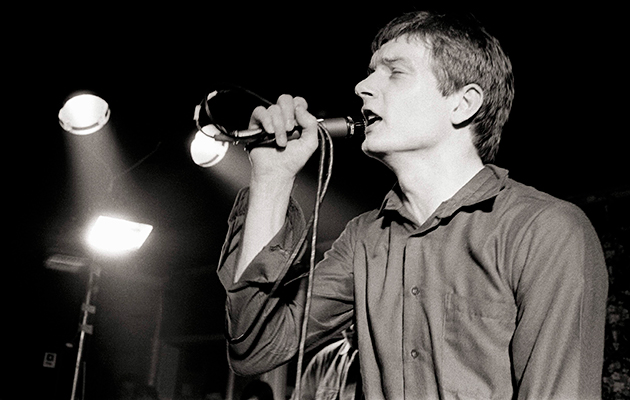Hindsight has endowed the making of Closer, Joy Division’s second album, with all manner of terrible intimations. Entire theses may well have been written parsing Curtis’ every action in the months running up to his suicide, seeing harbingers of doom in the most mundane acts.
The real story of Closer, though, is less melodramatic and poetic, and a lot more human and complex. It is about spirited young men on the cusp of fame, still uncomfortable with the idea of discussing – or even confronting – each other’s emotions. As 1979 came to a close, the quartet found themselves at the centre of a burgeoning cult, with June’s Unknown Pleasures having attracted the attention of Warner Brothers US. Using Hannett as a conduit, the label offered Joy Division – or at least Tony Wilson and Factory – £1 million for distribution rights and videos.
“We never heard about it,” a rueful Morris says now. “The solution Factory came up with was to send Martin and [sleeve designer] Peter Saville to do the negotiating. That’s why it never happened. If it was us, and somebody had offered us a substantial sum of money, we would have taken it.”
“Martin had arranged it,” adds Hook. “An A&R man came down. Martin was very upset, because he felt that was definitely the way to go. He’d been instrumental in getting this whole thing together and Rob and Tony [Wilson] just laughed at it. I think Martin had no illusions that people like Warners could have made life very easy for us, and made us huge.”
Meanwhile, the band themselves innocently got on with their business in Cheetham Hill, more or less fumbling towards transcendence. Their rehearsal room was opposite North Salford Youth Club, where Hook and Sumner had hung out as 14-year-olds. Here, between plays of Low and “Heroes”, Iggy’s Bowie albums and Kraftwerk, the songs of Closer began to take shape.
“We wrote a tune a week,” says Hook. “You could only practise for two hours on a Wednesday and three hours on a Sunday, which used to cost us 50p an hour. And the songs were mainly instigated on Sunday and finished off on Wednesday. We were on £1.50 a day during the whole of Joy Division. Unfortunately, we were happy on £1.50 a day.”
By early 1980, nearly all of the tracks that would make up Closer were at least half-written. “I’d say they were all written,” reckons Hook, “but then Martin [Hannett] got involved in adding more parts.”
“We’d all do our own thing,” says Sumner. “We didn’t really jam, we didn’t talk to each other about it. It was a pleasurable time, but with a certain uncertainty about Ian, because of his health. We’d finally got where we were aiming for, and America was beckoning. We were on the cusp, we were fantastic live. But on the other hand, we worried about Ian’s fits.”
Curtis’ epilepsy had started affecting Joy Division shows seriously when the band toured with the Buzzcocks in October 1979. “Really, we should have stopped then, but we didn’t, we just carried on,” admits Morris. In January 1980, the band made a chilly tour of the Netherlands, Belgium and Germany, unveiling some putative versions – untouched by Hannett – of the Closer material. With a comical austerity typical of the band, their haircuts were administered by Rob Gretton.
Six more UK gigs in February followed, before the band returned to where they’d recorded Unknown Pleasures, Strawberry Studios in Stockport (owned by 10cc and disapproved of by Sumner: “We didn’t like the sound in there, it was real ’70s gear, carpets on the wall. Everything was dead”) for a first attempt at one of the new songs. “‘Love Will Tear Us Apart’ came about due to the bass riff,” says Hook, “and me and Steve getting the backing track. There’s hardly any keyboards and on the first version there’s hardly any guitar. It was written quite simply.”
Morris: “Martin [Hannett] was into sonic experimentation. It was, ‘Fuck what the band want.’ He wanted to make a classic record. ‘Love Will Tear Us Apart’ is best described as a war of attrition. You’d do it, then you’d think you’d done it, and then you’d do it again and again and again…”
Sumner: “We were unhappy with the results. It was this constant to-ing and fro-ing with Martin. We all thought his production on Unknown Pleasures was really interesting, but it just didn’t catch the power of the band live. Peter Hook and I were keen for it not to happen again. We were constantly pushing him to make the sound more powerful.”
Hook: “Tony felt the songs we were writing were slower and darker, which I think you can safely say Closer is. I don’t know whether it was half in jest, but Tony suggested Ian listen to Frank Sinatra. And then Rob went out and bought him some Sinatra records and Ian did get into listening to Sinatra, which was quite funny. Quite nice, actually.”
Sumner: “We were at our friend Jasmine’s house in Walthamstow, before we got the ferry to go out to Europe [for live dates], and Frank Sinatra came on the telly. Ian said, ‘Frank Sinatra’s great.’ Either me or Rob went, ‘No, he’s shit.’ ‘No, he’s great.’ ‘No, he’s fucking SHIT!’ ‘You don’t know what you’re talking about, he’s fucking GREAT!’ And the whole argument escalated… I think Ian sang like Frank Sinatra on ‘Love Will Tear Us Apart’ to fuck us off.”



